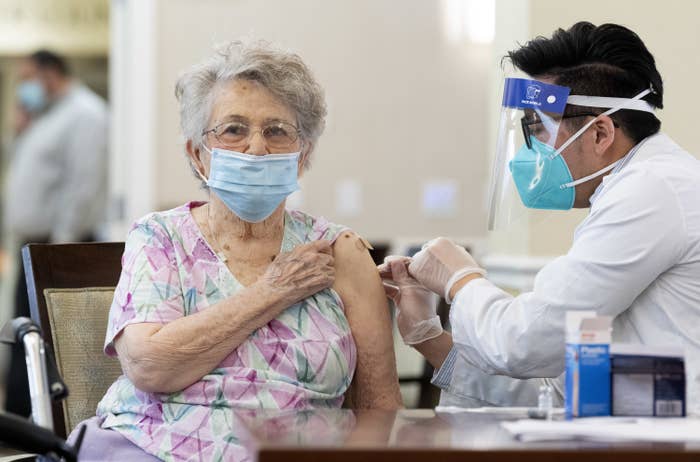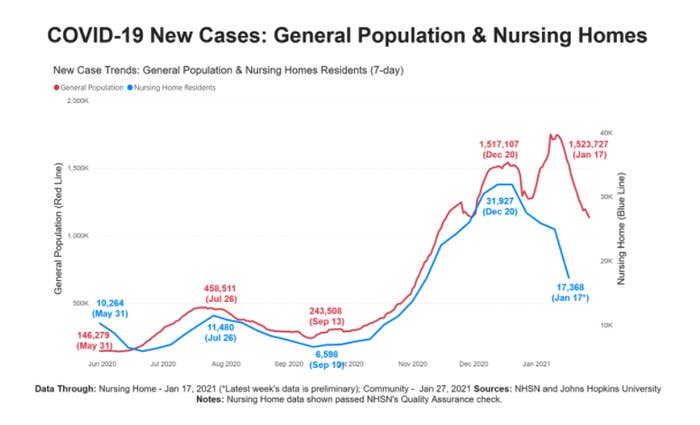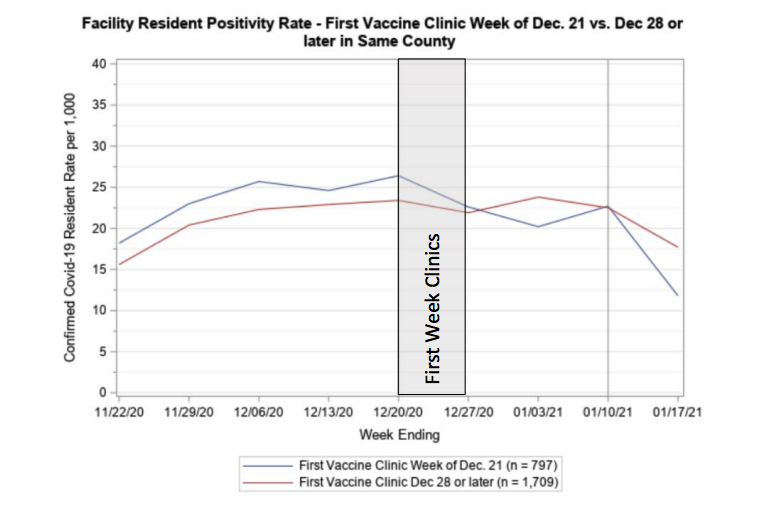
Vaccines are cutting down COVID-19 case numbers in US nursing homes, a federal health official reported on Thursday, a long-awaited break in the deadly grip of the pandemic on the most vulnerable older adults.
Nursing homes have been the deadliest place for people with COVID-19 throughout the pandemic, killing more than 150,000 residents and staff, so far. Vaccination at long-term care facilities was a high priority in the nationwide rollout of coronavirus vaccines that started in December, as COVID-19 cases reached record levels nationwide, and nursing homes locked down over the holidays. Now the vaccines are starting to make a difference, newly released health data suggests, accelerating a 22% drop in nursing home COVID-19 case rates seen from Dec. 20 to Jan. 10.
“We finally felt we turned the tide around the holiday time,” said Centers for Medicare and Medicaid Services chief medical officer Lee Fleisher, speaking on Thursday to a vaccine advisory panel of the US Health and Human Services Department.
“What we believe is beginning to be shown with this data is now we’re seeing the effect of both the interventions, but also the vaccine.”

Nursing home COVID-19 cases had been the “leading edge” of the US epidemic since last February, when an outbreak at a Washington state facility led to 46 deaths among residents, staff, and visitors, marking the start of deadly cases striking older adults nationwide. A sign of the turn of the tide of such cases due to vaccination would not be unexpected, as clinical trial data suggested a drop resulted among the immunized about two weeks after the first shot, said epidemiologist George Rutherford of the University of California, San Francisco, but is nonetheless heartening.
“These are really good vaccines, and we are seeing them take effect, which is wonderful,” said Rutherford. “The data showed that they had good efficacy even after one shot, which I suspect is what we are starting to see here.”
The evidence comes in a comparison of same-county COVID-19 cases in 800 vaccinated skilled nursing facilities against 1,7000 unvaccinated ones released on Thursday by an American Health Care Association research center. At a time when COVID-19 cases were dropping nationwide at nursing homes, ones that received their first shots in the third and fourth week of December saw a 48% decline against a 21% drop in the unvaccinated ones, more than twice as steep a fall just three weeks later in mid-January. Among staff, new COVID-19 cases dropped more in the ones that held those earlier vaccine clinics, by 33%, against ones that did not, which fell 18%, in the same counties.

“If verified with additional data, this could expedite the reopening of long-term care facilities to visitors,” said the AHCA’s David Gifford, in a statement on the analysis. Even more encouraging is evidence that the vaccines help limit the spread of the virus, the association suggested.
An alternative explanation for the drop is that natural immunity has increased among nursing home staff simply due to rising infections nationally, said Rutherford. But that doesn’t explain the within-county split in case rates between early and late vaccinated facilities, making the shots a better explanation. “It’s what we’ve been hoping to see,” he said.
News of vaccinations kicking in at nursing homes come at a pivotal moment in the pandemic, with a new more transmissible variant of the virus threatening to predominate nationwide by March, according to the CDC. A more recent report by the federal health agency found that while typically 78% of residents in more than 11,000 nursing homes nationwide had received a first vaccine shot in the first month of the rollout, only about 38% of staff had done so.
A federal partnership with pharmacy chains that administered vaccines within nursing homes will end in March. Because their past reluctance is fading, many staffers at those facilities are only getting their first shot now, said Fleisher, which will mean setting up booster shots for them outside that arrangement. As of Thursday, about 4.2 million COVID-19 vaccine shots have been administered in US long-term care facilities, according to the CDC, almost 800,000 of them second doses. According to surveys, said Fleisher, a big concern among those staff members, many of them paid hourly, is that if the vaccine causes side effects they will miss work and lose wages.
“There’s a lot of distrust, which is why we hear about the vaccines causing infertility, occasionally even the idea of microchip insertion,” he added. “There’s a lot of misinformation.”
